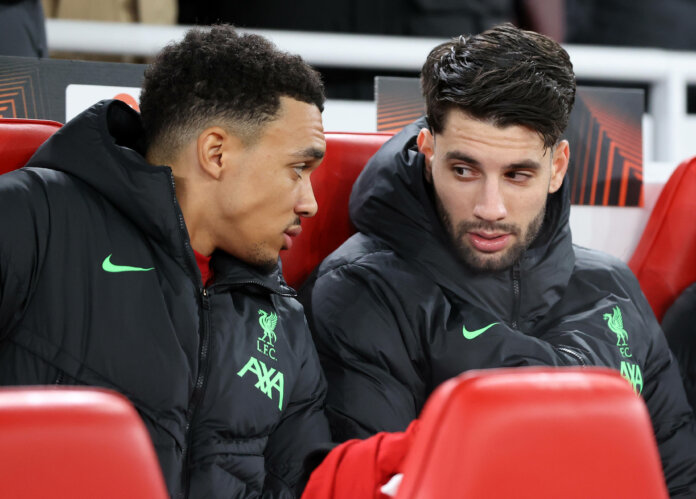Navigating the Perils of Player Injuries: Liverpool’s Latest Challenge
All has a large slice of deja vu this one truth be told. Injuries are an inevitable aspect of any sport, and football is no exception. However, in this case it doesn’t seem that straightforward and the recent re-injuries of Liverpool’s Trent Alexander-Arnold and Dominik Szoboszlai have once again sparked discussions on the efficacy of injury management and rehabilitation at Liverpool. There’ll be social media posts waiting to assassinate the medical team as we know. Whatever you think and it’s fair to question appearances here, it may not be that simple.
Trent Alexander-Arnold to miss Carabao Cup final with Chelsea after aggravating existing knee injury. @TimesSport
Injury Recurrence Raises Questions
Liverpool’s recent injury woes with Alexander-Arnold and Szoboszlai, who have both quickly relapsed into their previous conditions, compel us to examine the delicate equilibrium between a player’s recovery and the team’s exigencies. Alexander-Arnold’s knee injury and Szoboszlai’s hamstring issue have been sources of concern, affecting their playing time and impacting the team’s strategy. In the crudest form, it just doesn’t look good when two players come back from serious injury and the same thing happens after a couple of games for both.

Klopp’s Philosophy on Player Readiness
It may not be as simple as blaming the medical team though. Jurgen Klopp, Liverpool’s manager, has often shared his insights on dealing with player fitness. Regarding Diogo Jota, Klopp commented, “We sneaked him in somehow on the squad list because he trained only twice and the medical department wanted to give him extra training and I said he can have that in Burnley,” which highlights the careful consideration given to a player’s return. His approach to Jota’s readiness, appreciating his importance despite previous missed chances, underlines the multifaceted decision-making involved in bringing a player back from injury. It also shows he can disregard the medical team’s advice.
I'm sure everything was done properly and it is just bad luck but the optics really aren't great, are they? Trent and Szoboszlai both aggravate injuries having made just two appearances. Thiago pulled a hamstring in his first cameo in what felt like forever.
Delicate Balance of Return-to-Play Decisions
The conundrum of when to reintroduce a player to the field post-injury is complex. Just because it worked with Jota won’t mean it’ll work with everyone and it also adds weight to the theory that Klopp is the ultimate say in all matters team related. The management must weigh the medical advice against the player’s training performance and the team’s immediate needs. Klopp’s handling of Jota’s situation illustrates this balancing act and the inherent risks. If you missed the whole has Szoboszlai been overplayed by the manager then you maybe lucky in one way, but it’s another factor here against laying full responsibility at the medical team’s door.
Understanding the Medical Team’s Role
The recurrence of injuries to Alexander-Arnold and Szoboszlai puts the spotlight on the medical team, though it’s crucial to understand the unpredictability involved in healing and rehabilitation. Klopp’s comments on Jota serve as a reminder that decisions are made with the player’s and team’s best interests in mind, even if outcomes aren’t always favourable. It can’t be changed now whatever and it’s understandable that the easy thing is to lay the blame at those behind the scenes. However, we may never fully know the exact circumstances, whatever gets said at Friday’s press conference. There’ll be medical experts everywhere until then though.



